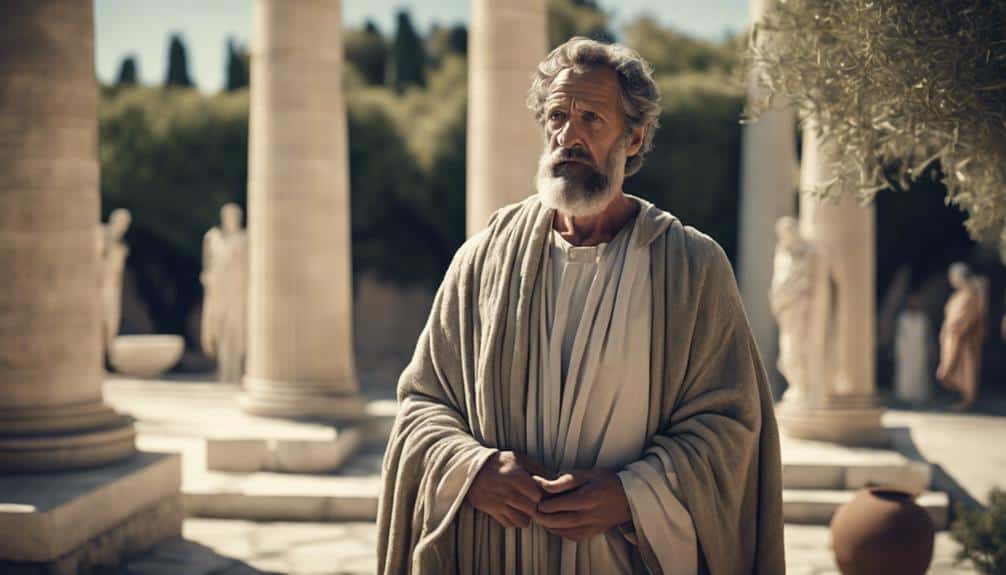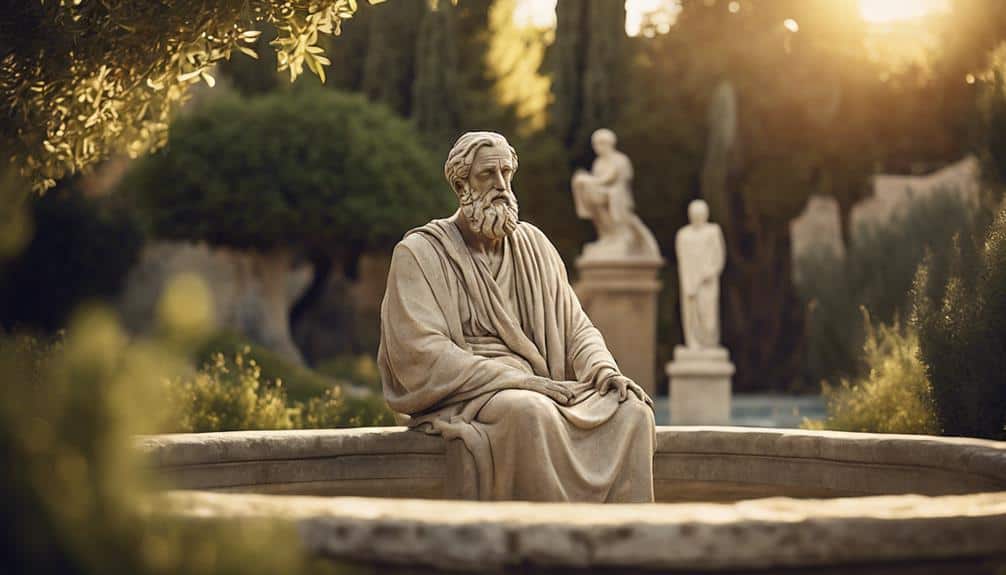Unlock the timeless wisdom of Stoic principles to navigate modern life's complexities with resilience, clarity, and inner peace.
Discover how ancient teachings from thinkers like Marcus Aurelius and Seneca can profoundly transform your life today.
Historical Background
In the rich tapestry of ancient philosophies, Stoicism stands out, having originated around 300 BC in Athens by Zeno of Sidium, who sought to guide individuals toward living virtuously in harmony with nature.
In the ancient world, where philosophical schools battled for intellectual dominance, Stoicism distinguished itself by its pragmatic approach to daily life. Zeno's teachings weren't abstract musings but practical guides meant to help you navigate life's complexities with resilience and virtue.
By delving into stoic principles, you uncover a philosophy that's deeply rooted in understanding human nature and the world around you. Imagine living in a time where the whims of fate were uncontrollable, and the only certainty was uncertainty. Stoicism offered a sanctuary of stability through its emphasis on internal control.
The ancient world, fraught with trials and tribulations, found solace in these teachings, which later captivated influential figures like Marcus Aurelius and Seneca.
As you reflect on this historical background, consider how these stoic principles—crafted in a distant past—still resonate today. They invite you to explore a timeless wisdom that transcends epochs, urging you to align your life with nature and virtue.
Core Stoic Principles

When you reflect on core Stoic principles, consider how wisdom and self-control shape your daily decisions and provide clarity amid chaos.
Justice and fairness, on the other hand, guide how you interact with others, urging you to act with integrity and empathy.
Wisdom and Self-Control
Understanding what lies within your control is essential for cultivating wisdom and practicing self-control, two core principles of Stoicism. The Stoic approach encourages mindful introspection and self-improvement through daily reflections and journaling. By examining your thoughts and actions, you can identify areas for growth and develop inner strength and resilience. This process isn't just about self-awareness; it's about fostering a mindset that better equips you to handle life's challenges.
Epictetus emphasized the importance of your reactions to events, advocating for clarity and perspective. Rather than being swayed by external circumstances, focus on your internal responses. This inner strength allows you to maintain balanced discipline and moderation, avoiding the pitfalls of overindulgence. Practicing self-control means making deliberate choices that align with your values, leading to a more harmonious and fulfilling life.
Balanced discipline involves not only controlling desires but also enjoying life's pleasures in moderation. This temperance fosters a sense of equilibrium, ensuring that you don't succumb to excess.
Through these practices, Stoicism offers a pathway to wisdom by helping you navigate life with a clear mind and a steady heart. In this way, you'll find greater peace and purpose.
Justice and Fairness
At the heart of Stoicism lies the principle of justice, which demands that you treat others with fairness, empathy, and integrity in every interaction. This core tenet is essential for fostering ethical conduct and societal harmony. By acting with fairness and empathy, you contribute to a world where mutual respect and understanding prevail.
To embody justice in your daily life, consider the following:
- Reflect on your moral responsibility: Understand that your actions impact others. Aim to act with integrity, ensuring that your decisions and behaviors align with your values and principles.
- Practice fairness consistently: Treat everyone you encounter with the same level of respect and consideration. This not only builds trust but also sets a standard for others to follow.
- Cultivate empathy: Make an effort to understand others' perspectives and experiences. By stepping into their shoes, you can respond with compassion and fairness, enhancing your relationships and contributing to societal harmony.
Marcus Aurelius, a prominent Stoic philosopher, emphasized the importance of right actions and ethical behavior. By adhering to the Stoic principle of justice, you uphold a commitment to moral responsibility and integrity, creating a ripple effect of positive change in your community.
Practical Wisdom

To truly embrace practical wisdom, you'll need to master the art of daily reflection and controlling your emotional reactions. Reflecting on your actions and thoughts each day helps you understand your strengths and areas for improvement.
Understanding Daily Reflection
Engaging in daily reflection empowers you to align your actions with Stoic principles, fostering greater self-awareness and resilience. This mindful introspection enables you to examine your thoughts, emotions, and behaviors with clarity and objectivity. By regularly evaluating your actions, you can confirm they're in harmony with Stoic virtues such as wisdom, courage, and justice.
Daily reflection offers a structured way to enhance self-awareness. It prompts you to contemplate what's within your control and to let go of what's not, thereby reducing unnecessary stress and fostering a sense of inner peace. Through this process, you gain valuable insights that help you respond more rationally to life's challenges.
To make the most of daily reflection, think about incorporating the following practices:
- Journaling: Write down your thoughts and actions each day to track your progress and identify areas for improvement.
- Contemplating virtues: Reflect on virtues like wisdom, courage, and justice, and how you can embody them more fully in your daily life.
- Evaluating actions: Review your actions to confirm they align with your values and principles, making adjustments as needed.
Controlling Emotional Reactions
Mastering your emotional reactions through practical wisdom is a cornerstone of Stoic philosophy, empowering you to navigate life's ups and downs with greater equanimity. Emotional regulation and mindfulness form the bedrock of this practice, helping you maintain a Stoic mindset in the face of adversity.
By focusing on what you can control—your thoughts and responses—you cultivate self-awareness and avoid being overwhelmed by external events.
In Stoicism, understanding that events themselves aren't inherently good or bad, but rather our judgments of them, allows you to pause and reflect before reacting. This self-discipline enables you to respond thoughtfully instead of impulsively.
Techniques like negative visualization and premeditatio malorum prepare you mentally for potential challenges, enhancing your emotional resilience.
Embracing Courage

In embracing courage, Stoicism teaches you to face daily struggles not with fear, but with resilience and a steadfast heart. This philosophy encourages you to confront adversity head-on, drawing from an inner strength that bolsters your daily resilience. By practicing courage, you don't just prepare for life's monumental challenges; you also arm yourself for the smaller, everyday battles that can wear you down.
Stoicism redefines courage, shifting it from grandiose acts of heroism to the daily bravery required to navigate life's obstacles. Embracing this viewpoint, you begin to see courage as a muscle that strengthens with use. Facing adversity with a resilient spirit leads to a sense of empowerment and fortitude.
Here are three ways to integrate Stoic courage into your life:
- Acknowledge Your Fears: Recognize what intimidates you, and confront these fears with a calm and composed mind.
- Practice Daily Resilience: Develop habits that build your resilience, such as mindfulness and reflection.
- Draw on Inner Strength: In moments of doubt, remind yourself of past victories and the strength you've demonstrated.
Practicing Justice

Just as courage empowers you to face life's challenges, practicing justice guides you in treating others with fairness, integrity, and empathy. In Stoicism, justice isn't just a lofty ideal—it's a moral duty deeply embedded in ethical conduct. Marcus Aurelius emphasized that our actions should reflect fairness and truthfulness, underscoring the significance of just interactions.
When you practice justice, you're committing to fair treatment of everyone you encounter. This means fostering honesty and integrity in all your relationships and dealings. It's about more than just following laws; it's about aligning your actions with a sense of moral responsibility.
Think of justice as your guiding compass, helping you navigate the complexities of human interactions with empathy and respect.
Cultivating Temperance

How often do you reflect on the role of moderation in achieving a balanced and fulfilling life? Cultivating temperance is a cornerstone of Stoic philosophy, focusing on moderation in all aspects of life. This practice isn't about denying pleasures but enjoying them in a balanced manner, fostering inner harmony and self-discipline.
Embarking on a self-discipline journey means acknowledging the power of self-control and avoiding overindulgence. This isn't just about resisting excesses but also about knowing when enough is enough.
Here are three key points to help you embrace temperance:
- Balanced Living: Practice moderation in your daily habits—whether it's eating, working, or socializing. Aim for a balance that promotes well-being, rather than pushing yourself to extremes.
- Inner Harmony: Cultivating temperance leads to a sense of inner peace. When your actions and thoughts are in balance, you experience a deeper connection with yourself and the world around you.
- Self-Discipline Journey: Temperance is a continuous journey of self-discipline. It requires constant reflection and dedication to maintaining balance, helping you navigate life's challenges with grace.


